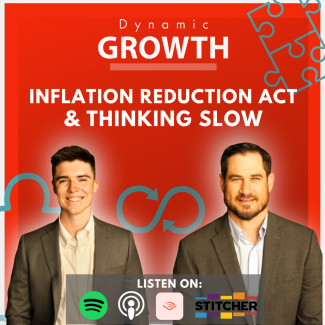
Inflation Reduction Act & Thinking Slow
We talked in our last podcast about words sometimes having more impact than actions. On the heels of inflation numbers coming out this week, we look forward to the commentary from the Federal Reserve that will follow.
A long-term investor inherently believes that over time the market will go up. In a surprise twist, investors saw stocks respond positively throughout July – even amidst the rising interest rates and inflation numbers.
So why did stocks perform well last month?
Nate and Derek have some opinions on the matter! Two major drivers:
- Investors interpreted the FED’s comments following the FOMC as they were running out of conviction. Specifically, the notion that interest rates were neutral, which means the FED doesn’t have much further to go in their tightening.
- We saw some mega stocks (like Apple) have great quarters and that performance signals that the economy is stronger than we think.
Ultimately, the economy appears to be too strong for the FED’s actions to date. Don’t believe us? Look at the job numbers and at company earnings, the FED is trying to dampen demand but it’s not happening. As the FED holds on to the idea of a soft landing, we are asking ourselves what is going to bring the 40-year high inflation down. Every time the market rallies it is delaying the inevitable and unfortunately, we may be in for a reality check sooner rather than later. It’s become a real possibility that we are looking at a deeper recession than people were anticipating.
Speaking of inflation …
Here’s something that may not help – the inflation reduction act. This week the Senate passed a new bill to try and reduce inflation, starting with $740B in government spending. If this seems somewhat counterproductive, you are not alone – we’ll leave it at that.
Historically we have seen that governments printing money hasn’t helped ease inflation. In 2008, we didn’t have the supply chain issues that we have today, which may result in some unforeseen issues with supply and demand. The bill also includes increased taxes on corporations and the IRS has doubled their manpower to crack down on tax fraud.
We can’t help but wonder if this bill is more for show. Perhaps it’s simply an attempt to do something.
Across the pond, we heard from the Bank of England that they predict their inflation will run until October topping at about 13% CPI. That will be followed by a deep recession, lasting five quarters. The US central bank is certainly taking a different approach to try and ease people’s minds. I guess we’ll wait and see which approach was more effective.
You should always be in the market
If the bull and the bear can teach us anything, it is to stay the course and always be ‘in’ when it comes to the market. Nate recently found a couple studies that unscored this message and highlighted some key points. Looking at the total returns over the last 20 years, compounding from roughly 10,000 trading days, the study found that the best returns were achieved in 35 of those days.
Meaning …
- If you were out of the market for just 5 of those days, your cumulative return would have been reduced by 50%
- If you missed 10 of the best days for the last 112 years, you would have missed 75%
This proves to us something we all already know, be in the market. Some investors are either all in or all out at any given time, but we suggest another approach. Consider the market cycle and invest in things that are attractive at that moment – things like:
- Structured notes
- Long duration bonds
- Precious metals
- Commodities
- Cash
The trick to a good investor is to think slowly – and find a trading partner! When you have a gut reaction, bring it up to your trading partner and ask yourself ‘what has changed’ before you make decisions about the investment position.
Take a minute and respond with purpose and insights.
Please note: This content is not a direct recommendation for investment. Investing involves risk including the potential loss of principal. Not all investments are suitable for all people. Crosby Advisory Group, LLC is a registered investment advisor in Ohio, Florida, and Texas.

